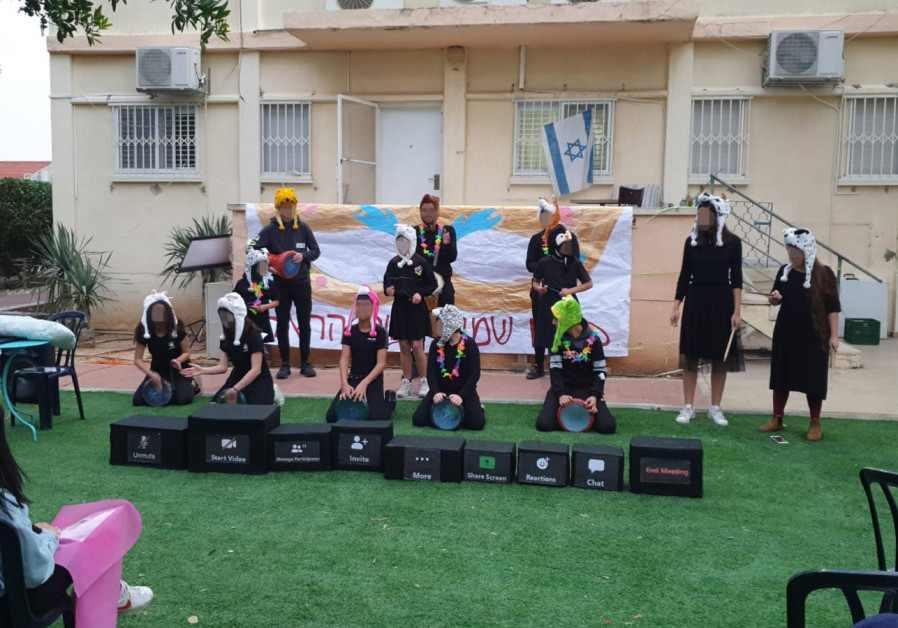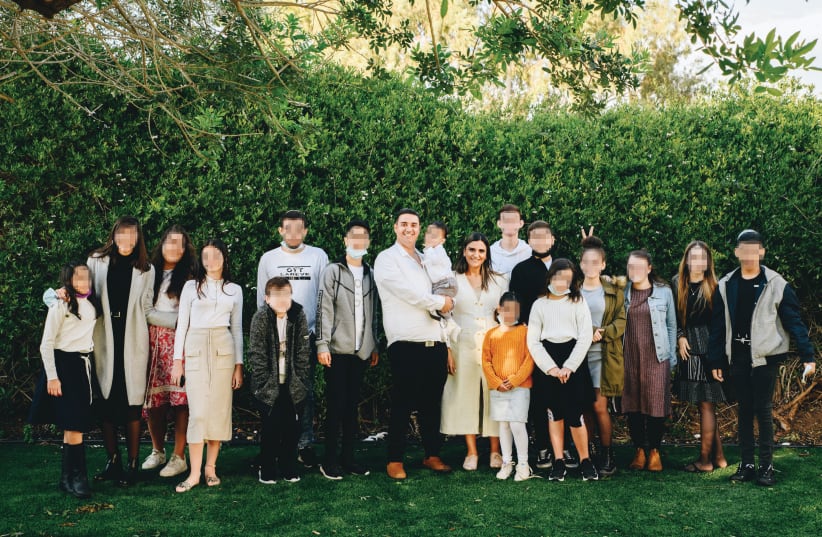As lockdown followed lockdown and our patience was being sorely tested, it was all too easy to slip into the depths of depression. We really didn’t know when all the pandemic rules and regulations were going to run their course, and when we could reclaim some semblance of a normal life. It was getting increasingly difficult to find some glimmer of hope, something to perk us up and get the positive vibes flowing once more.
If I needed reminding that there is still good out there and there are people who are simply doing their best to improve the lot of others selflessly, I found that in joyful abundance when I cycled over to Ashkelon recently to meet Barak and Hadar Alon. The two thirty-somethings have a couple of tiny tots of their own, and the small matter of a dozen other kids, covering the 4th-grade to 12th-grade age spectrum, to care for.
The Alons live at the Neveh Ha’roeh Children’s Village which was established in 1977, by the Hamifal – Educational Children’s Homes nonprofit, in order to provide local religious Jewish at-risk youngsters with an educational and rehabilitative framework. The facility works on the basis of six family units, one of which is currently entrusted to the clearly capable and enthused hands, and hearts, of the Alons.
Hamifal has been doing good deeds for quite some time – in fact, since before the State of Israel came into being. It was founded in Jerusalem in 1943 by Recha Freier, whose sterling work on behalf of members of the younger generation also included initiating the Aliyat HaNoar (Youth Aliyah) organization in Berlin in January 1933, the same day Adolf Hitler came to power. Aliyat HaNoar was responsible for getting thousands of Jewish children out of Nazi-controlled Europe before WWII, and taking thousands more from post-war DP camps to Palestine.

BEFORE WE started talking about the logistical, emotional and other ins and outs of serving as foster parents to a dozen children and youth with more than their fair share of personal issues, I remarked to Hadar that most mothers – parents – of two young children with barely over a year between them would struggle to cope with just that handful. I had already taken her upbeat outlook on life on board, but I was still surprised by her reply.
“This is the best thing I could have done for my kids and for the whole gang,” she said. “The older one [all of 15 months old] is blossoming. He has company all day long and he is so sociable.”
It is a fully reciprocal relationship.
“The foster children have great fun with him. They love it when he responds to them, when he dances when they put on music in the morning. And I told Barak this is the best thing I could have done for myself, too.”
Not that the Alons had to go too far.
“We came here in September, right into the whole mess of the lockdowns and all that,” she laughs, adding they had set their sights – literally – on taking up their posts at the children’s village a while before they moved in. “We lived on the other side of the street. The whole time I told Barak I was dying to be part of the village. I’d hear the boys and girls, although I couldn’t see them. But Barak used to pray at the synagogue here on Shabbat, so he had a better idea of the place.”
Hadar came into the job largely unprepared, on a professional level, having previously worked in customer services for an insurance company. Barak, at least, is a qualified social worker and some time ago spent a year working as an instructor at a boarding school, so in that sense he had quite a head start on his better half. He, Hadar and the other foster parents at Hamifal villages dotted around the country need all the professional skills and emotional wherewithal they can muster to help guide their wards through the rocky waters of their early years and prepare them for life.
As we chatted, Hadar divided her attention between me and her then month-and-a-half-old baby, who, if his relaxed demeanor was anything to go by, was clearly benefiting from the foster family vibes too.
“It is my job to reconnect people with their own community, the environment in which they live,” Barak notes.
So, I mused, do the years the kids spend at the village form part of the process of reintegrating them into their original social milieu?
Barak set me right on that one.
“Actually it’s the other way round. Here we are building a community.”
But, surely, the community to which he refers is one that functions outside the boundaries of everyday society.
“Not at all,” he counters. “The kids here go to regular schools. The whole model of this village is a family-based, educational model.”
The youngsters may come from broken homes, or familial backdrops that were not able to provide them with the necessary physical and/or emotional support, but, Barak explains, the two entities are not mutually exclusive.
“We aim to create a family that exists alongside the [biological] existing family. They are not estranged from their families. They go back to their own families every second weekend. We, and they, are in touch with the parents.”
This is clearly a different support system compared with, say, Beit Hashanti, which takes in youths off the street, who have often been abandoned by their biological families.
“There may be a situation whereby, for example, the mother has died and there simply isn’t the ability there to care for the child,” Barak elucidates.
Some of the children come to the villages damaged by emotional and physical neglect, rejection, lack of nutrition, or physical, sexual or emotional abuse.
The youngsters, referred by the welfare services to Neveh Ha’roeh, may be initially in difficult emotional and/or logistical straits but, while the village system is designed to give the kids a helping hand – and should the need arise, a shoulder to cry on – there are duties and obligations to be met too. The foster family framework is there to help them deal with their immediate and ongoing issues, but also to get to grips with life in the outside world.
“I think the objective is to teach them how a healthy family operates,” Hadar posits.
That, she appreciates, is no given.
“I can’t show them a model of peace and love, and that everything is amazing, because they will go out into real life and they’ll have to accept that just isn’t the way it is.”
It is, she says, a learning process.
“There are crises and we have to learn how to get through them.”
Presumably the fact that they are the beneficiaries of unconditional love helps with that.
“They know that,” Hadar says. “We have had conversations with some of them, when emotions are heightened, and we all have to learn how to take a step back, and we have to educate them.”
That does not just mean the Alons sharing some of their accrued life experience, and life skills, with their young charges.
“The easiest thing for them is to give up. To just fade into the woodwork, so people don’t notice you,” Barak states.
There is a rights-and-obligations balance to be maintained.
“We don’t allow that to happen. We tell them we trust them, and they have to take responsibility too.”
WHILE THE Alons do not presume to take the place of the children’s biological parents, they do exercise some sort of parental regime.
“I can tell one of the kids that I am really angry with them and that I love them a lot,” says Hadar.
The proof of disciplinary pudding is there to be had.
“The children take that. They feel secure with us.”
The Alons say they don’t try to compensate for any shortcomings in the children’s earlier years, at home with their own biological families, by creating a kind of idyllic framework where they are cloistered from the challenges and hardships of the big wide world.
“They can see we are not perfect, either,” Hadar stresses. “They can see that it is not all about euphoria. Life is not a Hollywood movie.”
The emphasis on the collective, mutual support and nurturing a sibling-like relationship is all important for the Alons.
“When one of the kids has a birthday, it is not just about them,” Barak explains. “It is very much about the family unit. The whole group celebrates the fact that one of the members has a birthday. The birthday boy or girl is, of course, in the limelight but it is a celebration for everyone.”
The foster parent-ward relationship is clearly not just a technical matter.
“When I had my baby we had the brit here,” says Hadar. “The kids were part of the festivities and, of course, they saw my belly growing through the pregnancy. Mind you, not all of them quite got how I went away with a belly and came back with a baby,” she adds with a laugh.
Naturally, as any parent can testify, bringing up children is not just a sweetness-and-light passage of time. There are tough moments, personal crises, and the odd tantrum or two. As children grow, gain a deeper understanding of themselves and how they fit into the world around them, they realize there are new emotional domains to be fathomed too. The Alons say they adopt a collaborative approach to that sticky minefield.
“There is the option of collective thinking. You are not alone.”
But that does not mean the youngster doesn’t have some work to put in.
“One of the kids can come to me and cry,” Hadar notes, “but it is not just a matter of moaning. It is about sharing. That is what we are here for.”
The Alons say they are under no illusions about their ability to solve everyone’s problems.
“We didn’t come here to put the whole world right,” says Barak. “Yes, we believe we are improving things for the kids but we take things one at a time. We tackle the challenges as they arise. It is a process.”
That goes for all concerned.
“We came here to set an example,” Hadar says. “If that has some positive effect on the kids, and how they live later on outside and, maybe, even impact on others around them, that would be wonderful. We couldn’t hope for more.”
Their young charges could not have hoped for a more supportive and dedicated couple, and protective yet illuminating framework, to see them through their childhood and adolescence.
It warms the very cockles.
For more information about Hamifal: www.hamifal.org.il
